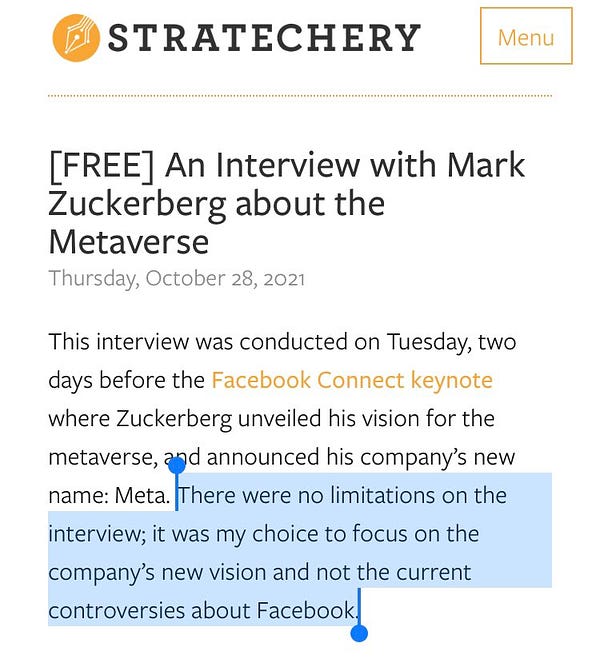Flying Cars, Utopias & the Metaverse
The metaverse is part of a time-tested distraction campaign that humanity loves.
For all the media’s much-ballyhooed vendetta against the technology industry, there is one insatiable addiction that overwhelms reporters’ hostility to tech. That is, publishing outlandish prognostications about the future.
This is a shamelessly time-tested symbiosis between technology companies and the people who write about them.
Remember when we used to talk about “Google X,” the search giant’s incubator for futuristic technology?
Now, when you search for the term in Google’s own search engine the top suggested question is, “Is Google X still a thing?”
Remember Google’s effort to build the “City of the Future”?
During the pandemic, the company abandoned the project, in which Google intended to develop a section of Toronto.
In 2015, the New York Times wrote:
Google’s ambitions and investments have increasingly broadened beyond its digital origins in Internet search and online advertising into the arena of physical objects: self-driving cars, Internet-connected eyeglasses, smart thermostats and a biotech venture to develop life-extending treatments.
Now Google is getting into the ultimate manifestation of the messy real world: cities.
Where are Google’s internet-connected eyeglasses? Can I live forever yet?
Yes, smart thermostats are doing okay — but they’re not the world-changing technology that once earned Nest ecstatic coverage. And Google had to buy Nest to make it possible.
Self-driving cars are the obvious case study here.
I’ll grant that Google’s self-driving car project (now Waymo) might still end up proving to be a rational economic investment. But the public has been teased street-ready Google self-driving cars for more than a decade! A company can do research on a promising technology without making that unproven idea the face of the company’s marketing strategy.
In 2010, the New York Times wrote “Google Cars Drive Themselves, in Traffic.”1 The story says self-driving cars are “years from mass production.” That’s technically accurate but I don’t know that people reading the story then, or reporters that wrote countless other self-driving car stories in the years to follow, thought that the autonomous vehicles would take anywhere near this long given what Google was selling us.
Uber and Lyft picked up the Google playbook. (Literally, Uber’s top communications executives used to work at Google.)
In 2016, Lyft President John Zimmer predicted that a “majority” of the company’s rides would be self-driving by 2021.
Oops!
Don’t forget Uber’s flying car program, Uber Elevate.
Even Postmates, the food delivery company, had to get in the game with its never-going-to-happen at scale food delivery robot.
The public relations executives at these companies know the playbook well. They’re not humoring their futurist bosses. They understand that the media and the public have an insatiable appetite for promises of a super cool, techno future.
Postmates pitched me on that robot all the time. Bloomberg literally flew me to a conference in Los Angeles to watch Uber prognosticate about its flying car program. We built a mini TV set just to talk to Uber’s resident futurist about the company’s ambitions.
Even when the media reports on these predictions skeptically and with the appropriate caveats — as many outlets are doing now — they help shift the discussion to the future and away from the problem’s of today’s technologies. The press can’t pretend not to see Facebook's metaverse spectacle at all. Reporters would be drawing a shade between the story and the public. So reporters are stuck.
And, of course, Facebook is using all of its power to tip the scales in favor of writers who are more inclined to redirect readers’ attention to the future and away from Facebook’s problems in the present. There’s a new media ecosystem filled with newsletter writers and other indie publishers who are happy to talk about the future.
So for all the old-school media’s obsession with disinformation and privacy, don’t forget that parroting wild predictions about the future is the other side of the coin.
Media and public moods ebb and flow. We've slipped into an angry stream for quite a while now.
That’s why we have Andreessen Horowitz out trying to create a brand with the literal name “Future.” They’re not going to sit around and wait for the press to start printing their wild prognostications again. They’re going to do it themselves. (Of course without the middleman to launder your claims about the future, those pronouncements can come off as more self-evidently speculative and self-serving.)
And now Facebook — or excuse me, Meta — is forcing the issue in the most heavy-handed way possible. Facebook is embracing Google’s strategy of misdirection down to changing its name. It’s a strategy to help you (and regulators) forget that both companies’ revenues come from their core products — not their wildly futuristic ambitions. (If you want to know what these companies really prioritize, just listen to an earnings call.)
Let me be clear, I’m happy to see Google and Facebook invest in the future. I’m glad companies are doing self-driving car research. I agree with the techno-utopians that the U.S. government isn’t delivering and I’m glad that the tech industry is picking up the slack. And it’s all in good fun to dream about the future. Maybe we’d all live happier lives if we just drank the Kool-Aid these tech companies are serving us.
And I think the media is conscious of the game Facebook is playing this time around. It’s as shameless as I’ve ever seen. But it’s extremely hard to combat the misdirection. Human beings have listened to their corporate overlords sell them on a utopian future since the days of the World’s Fair.
I’ll also acknowledge here that sometimes — and this seems true in the case of Facebook — companies warn people that the technology is far off. But there’s still manipulation going on here. Companies can’t help but show off more polished products than what they can actually produce.
If I’m starting to sound like a nihilist, saying that we can’t escape this fate: Companies sell the future, the media ends up amplifying it no matter how apprehensively the stories are framed, and the American public loves to ponder a better world.
There is one company that avoids this trap.







